Health Financing Comparison: UK, Mexico, and Ghana Healthcare Systems
VerifiedAdded on 2022/12/27
|12
|3820
|36
Report
AI Summary
This report provides a comparative analysis of healthcare financing systems in the UK, Mexico, and Ghana. It examines the percentage of GDP spent on healthcare, financing mechanisms such as the NHS in the UK, IMSS and Seguro Popular in Mexico, and tax-funded systems in Ghana. The report further explores the advantages and disadvantages of each system, including the efficiency and accessibility of the NHS, the tiered structure of the Mexican system, and the decentralized nature of Ghana's healthcare financing. It also highlights the impact of these financing systems on service delivery and identifies areas of health inequalities. Recommendations are provided to address health inequalities within Ghana's healthcare system. The report underscores the importance of adequate funding, infrastructure, and effective service delivery in ensuring equitable healthcare access and outcomes.
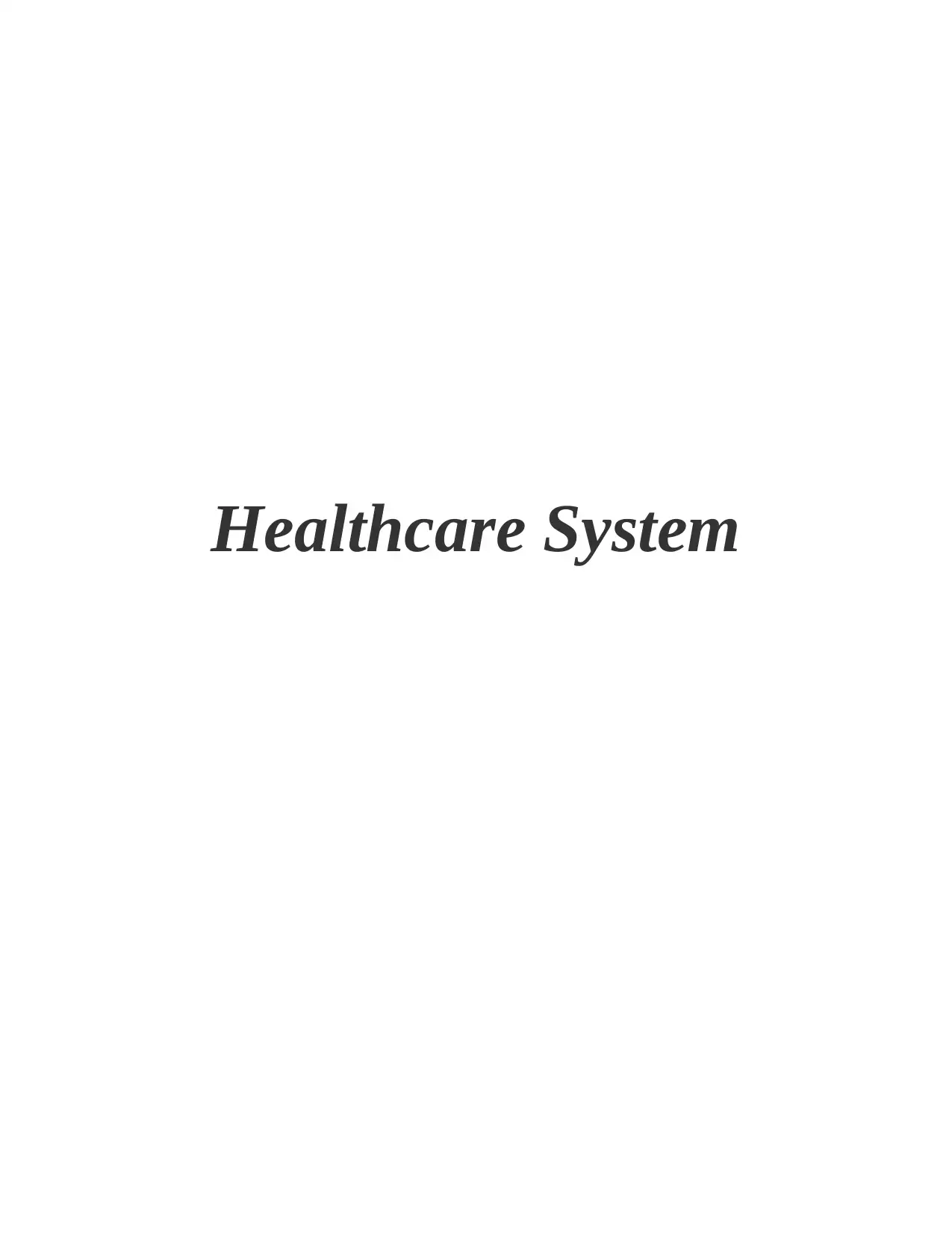
Healthcare System
Secure Best Marks with AI Grader
Need help grading? Try our AI Grader for instant feedback on your assignments.
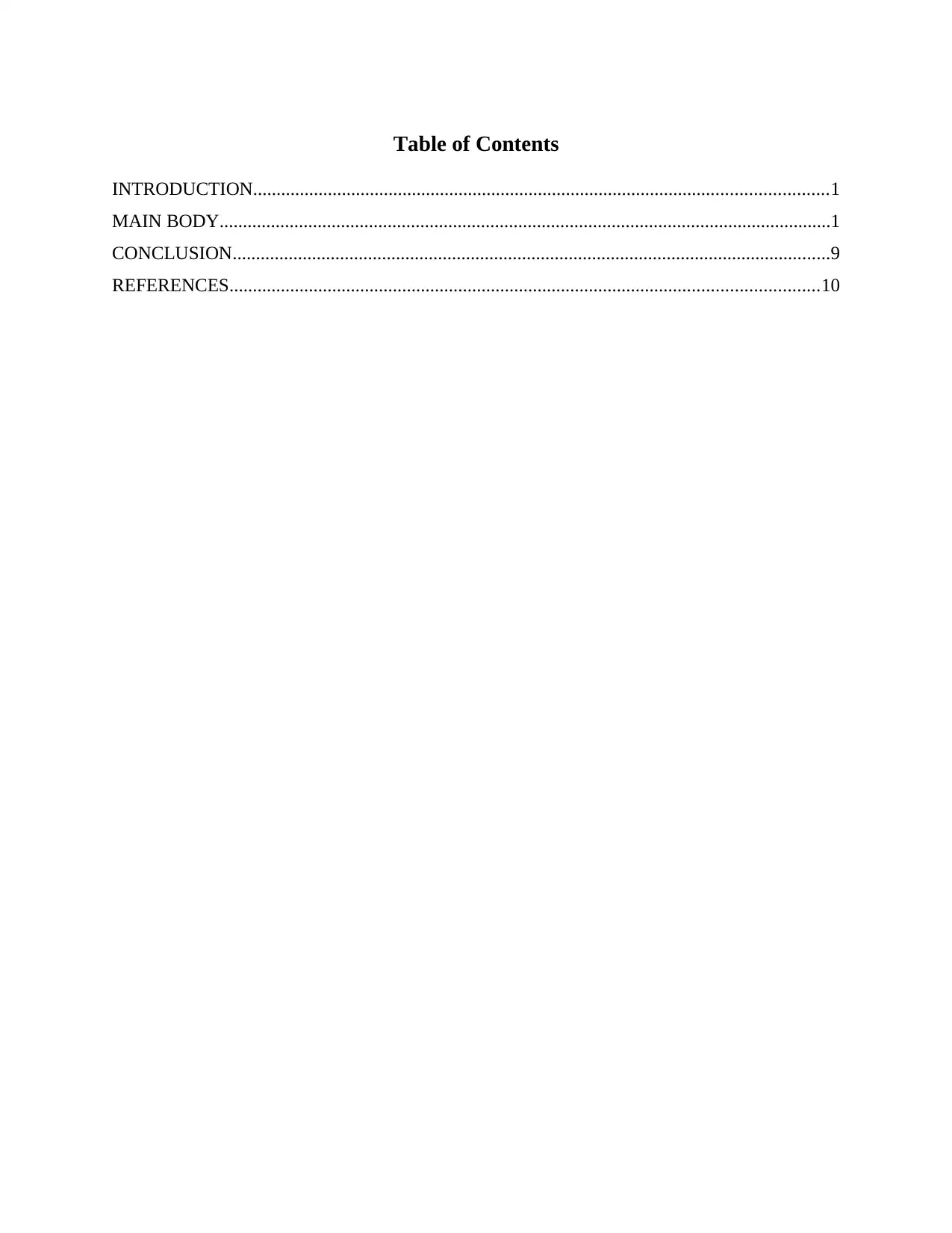
Table of Contents
INTRODUCTION...........................................................................................................................1
MAIN BODY...................................................................................................................................1
CONCLUSION................................................................................................................................9
REFERENCES..............................................................................................................................10
INTRODUCTION...........................................................................................................................1
MAIN BODY...................................................................................................................................1
CONCLUSION................................................................................................................................9
REFERENCES..............................................................................................................................10
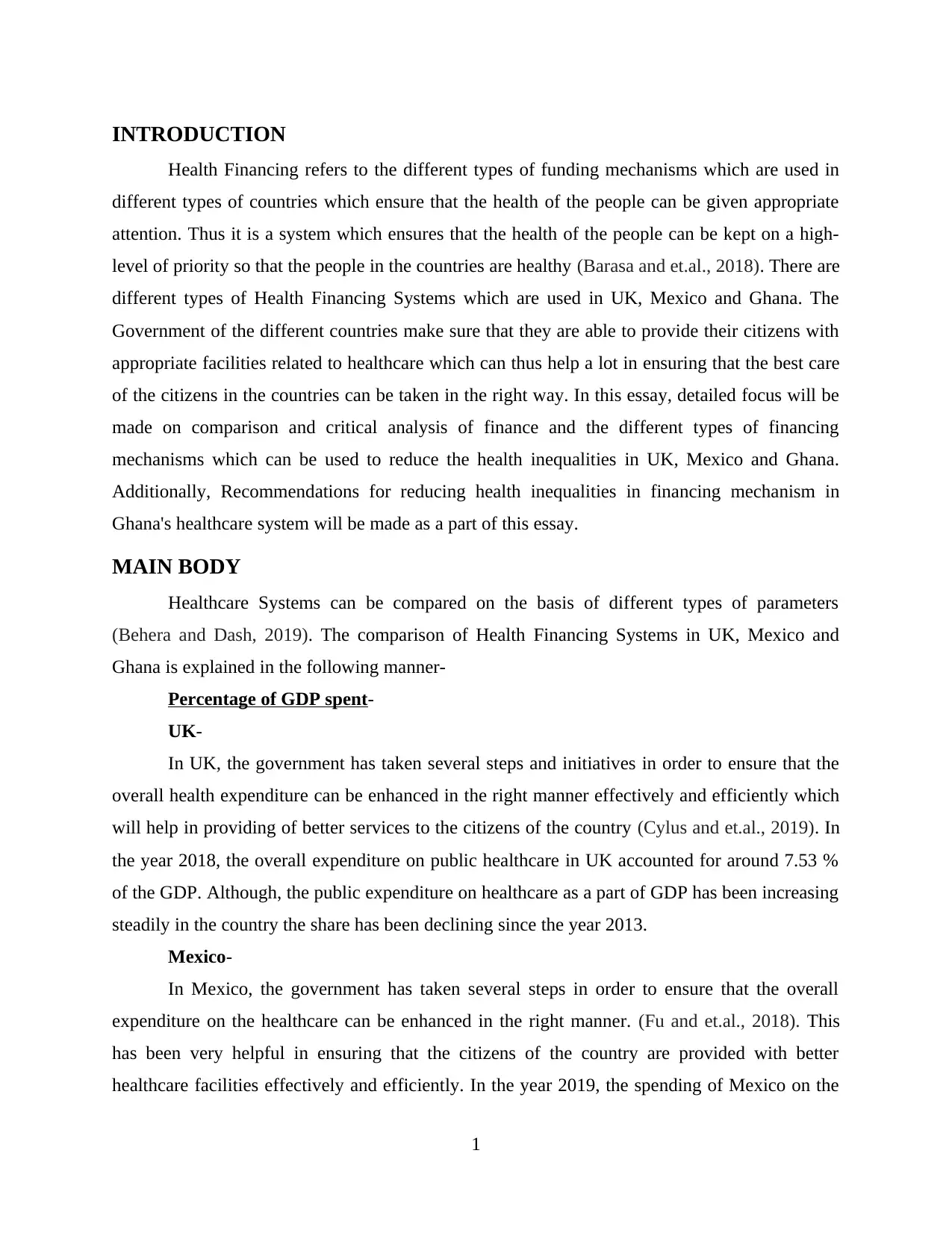
INTRODUCTION
Health Financing refers to the different types of funding mechanisms which are used in
different types of countries which ensure that the health of the people can be given appropriate
attention. Thus it is a system which ensures that the health of the people can be kept on a high-
level of priority so that the people in the countries are healthy (Barasa and et.al., 2018). There are
different types of Health Financing Systems which are used in UK, Mexico and Ghana. The
Government of the different countries make sure that they are able to provide their citizens with
appropriate facilities related to healthcare which can thus help a lot in ensuring that the best care
of the citizens in the countries can be taken in the right way. In this essay, detailed focus will be
made on comparison and critical analysis of finance and the different types of financing
mechanisms which can be used to reduce the health inequalities in UK, Mexico and Ghana.
Additionally, Recommendations for reducing health inequalities in financing mechanism in
Ghana's healthcare system will be made as a part of this essay.
MAIN BODY
Healthcare Systems can be compared on the basis of different types of parameters
(Behera and Dash, 2019). The comparison of Health Financing Systems in UK, Mexico and
Ghana is explained in the following manner-
Percentage of GDP spent-
UK-
In UK, the government has taken several steps and initiatives in order to ensure that the
overall health expenditure can be enhanced in the right manner effectively and efficiently which
will help in providing of better services to the citizens of the country (Cylus and et.al., 2019). In
the year 2018, the overall expenditure on public healthcare in UK accounted for around 7.53 %
of the GDP. Although, the public expenditure on healthcare as a part of GDP has been increasing
steadily in the country the share has been declining since the year 2013.
Mexico-
In Mexico, the government has taken several steps in order to ensure that the overall
expenditure on the healthcare can be enhanced in the right manner. (Fu and et.al., 2018). This
has been very helpful in ensuring that the citizens of the country are provided with better
healthcare facilities effectively and efficiently. In the year 2019, the spending of Mexico on the
1
Health Financing refers to the different types of funding mechanisms which are used in
different types of countries which ensure that the health of the people can be given appropriate
attention. Thus it is a system which ensures that the health of the people can be kept on a high-
level of priority so that the people in the countries are healthy (Barasa and et.al., 2018). There are
different types of Health Financing Systems which are used in UK, Mexico and Ghana. The
Government of the different countries make sure that they are able to provide their citizens with
appropriate facilities related to healthcare which can thus help a lot in ensuring that the best care
of the citizens in the countries can be taken in the right way. In this essay, detailed focus will be
made on comparison and critical analysis of finance and the different types of financing
mechanisms which can be used to reduce the health inequalities in UK, Mexico and Ghana.
Additionally, Recommendations for reducing health inequalities in financing mechanism in
Ghana's healthcare system will be made as a part of this essay.
MAIN BODY
Healthcare Systems can be compared on the basis of different types of parameters
(Behera and Dash, 2019). The comparison of Health Financing Systems in UK, Mexico and
Ghana is explained in the following manner-
Percentage of GDP spent-
UK-
In UK, the government has taken several steps and initiatives in order to ensure that the
overall health expenditure can be enhanced in the right manner effectively and efficiently which
will help in providing of better services to the citizens of the country (Cylus and et.al., 2019). In
the year 2018, the overall expenditure on public healthcare in UK accounted for around 7.53 %
of the GDP. Although, the public expenditure on healthcare as a part of GDP has been increasing
steadily in the country the share has been declining since the year 2013.
Mexico-
In Mexico, the government has taken several steps in order to ensure that the overall
expenditure on the healthcare can be enhanced in the right manner. (Fu and et.al., 2018). This
has been very helpful in ensuring that the citizens of the country are provided with better
healthcare facilities effectively and efficiently. In the year 2019, the spending of Mexico on the
1
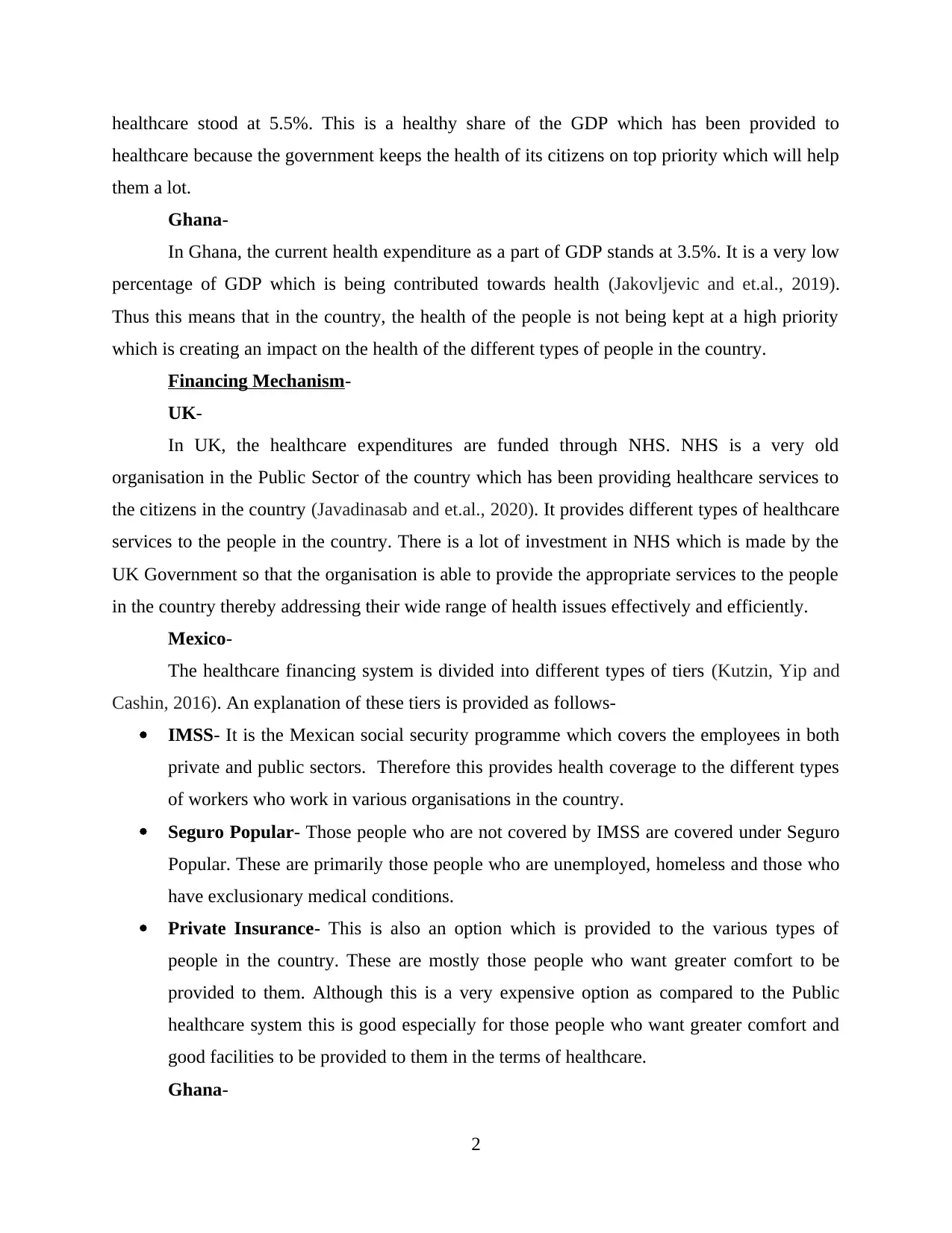
healthcare stood at 5.5%. This is a healthy share of the GDP which has been provided to
healthcare because the government keeps the health of its citizens on top priority which will help
them a lot.
Ghana-
In Ghana, the current health expenditure as a part of GDP stands at 3.5%. It is a very low
percentage of GDP which is being contributed towards health (Jakovljevic and et.al., 2019).
Thus this means that in the country, the health of the people is not being kept at a high priority
which is creating an impact on the health of the different types of people in the country.
Financing Mechanism-
UK-
In UK, the healthcare expenditures are funded through NHS. NHS is a very old
organisation in the Public Sector of the country which has been providing healthcare services to
the citizens in the country (Javadinasab and et.al., 2020). It provides different types of healthcare
services to the people in the country. There is a lot of investment in NHS which is made by the
UK Government so that the organisation is able to provide the appropriate services to the people
in the country thereby addressing their wide range of health issues effectively and efficiently.
Mexico-
The healthcare financing system is divided into different types of tiers (Kutzin, Yip and
Cashin, 2016). An explanation of these tiers is provided as follows-
IMSS- It is the Mexican social security programme which covers the employees in both
private and public sectors. Therefore this provides health coverage to the different types
of workers who work in various organisations in the country.
Seguro Popular- Those people who are not covered by IMSS are covered under Seguro
Popular. These are primarily those people who are unemployed, homeless and those who
have exclusionary medical conditions.
Private Insurance- This is also an option which is provided to the various types of
people in the country. These are mostly those people who want greater comfort to be
provided to them. Although this is a very expensive option as compared to the Public
healthcare system this is good especially for those people who want greater comfort and
good facilities to be provided to them in the terms of healthcare.
Ghana-
2
healthcare because the government keeps the health of its citizens on top priority which will help
them a lot.
Ghana-
In Ghana, the current health expenditure as a part of GDP stands at 3.5%. It is a very low
percentage of GDP which is being contributed towards health (Jakovljevic and et.al., 2019).
Thus this means that in the country, the health of the people is not being kept at a high priority
which is creating an impact on the health of the different types of people in the country.
Financing Mechanism-
UK-
In UK, the healthcare expenditures are funded through NHS. NHS is a very old
organisation in the Public Sector of the country which has been providing healthcare services to
the citizens in the country (Javadinasab and et.al., 2020). It provides different types of healthcare
services to the people in the country. There is a lot of investment in NHS which is made by the
UK Government so that the organisation is able to provide the appropriate services to the people
in the country thereby addressing their wide range of health issues effectively and efficiently.
Mexico-
The healthcare financing system is divided into different types of tiers (Kutzin, Yip and
Cashin, 2016). An explanation of these tiers is provided as follows-
IMSS- It is the Mexican social security programme which covers the employees in both
private and public sectors. Therefore this provides health coverage to the different types
of workers who work in various organisations in the country.
Seguro Popular- Those people who are not covered by IMSS are covered under Seguro
Popular. These are primarily those people who are unemployed, homeless and those who
have exclusionary medical conditions.
Private Insurance- This is also an option which is provided to the various types of
people in the country. These are mostly those people who want greater comfort to be
provided to them. Although this is a very expensive option as compared to the Public
healthcare system this is good especially for those people who want greater comfort and
good facilities to be provided to them in the terms of healthcare.
Ghana-
2
Secure Best Marks with AI Grader
Need help grading? Try our AI Grader for instant feedback on your assignments.
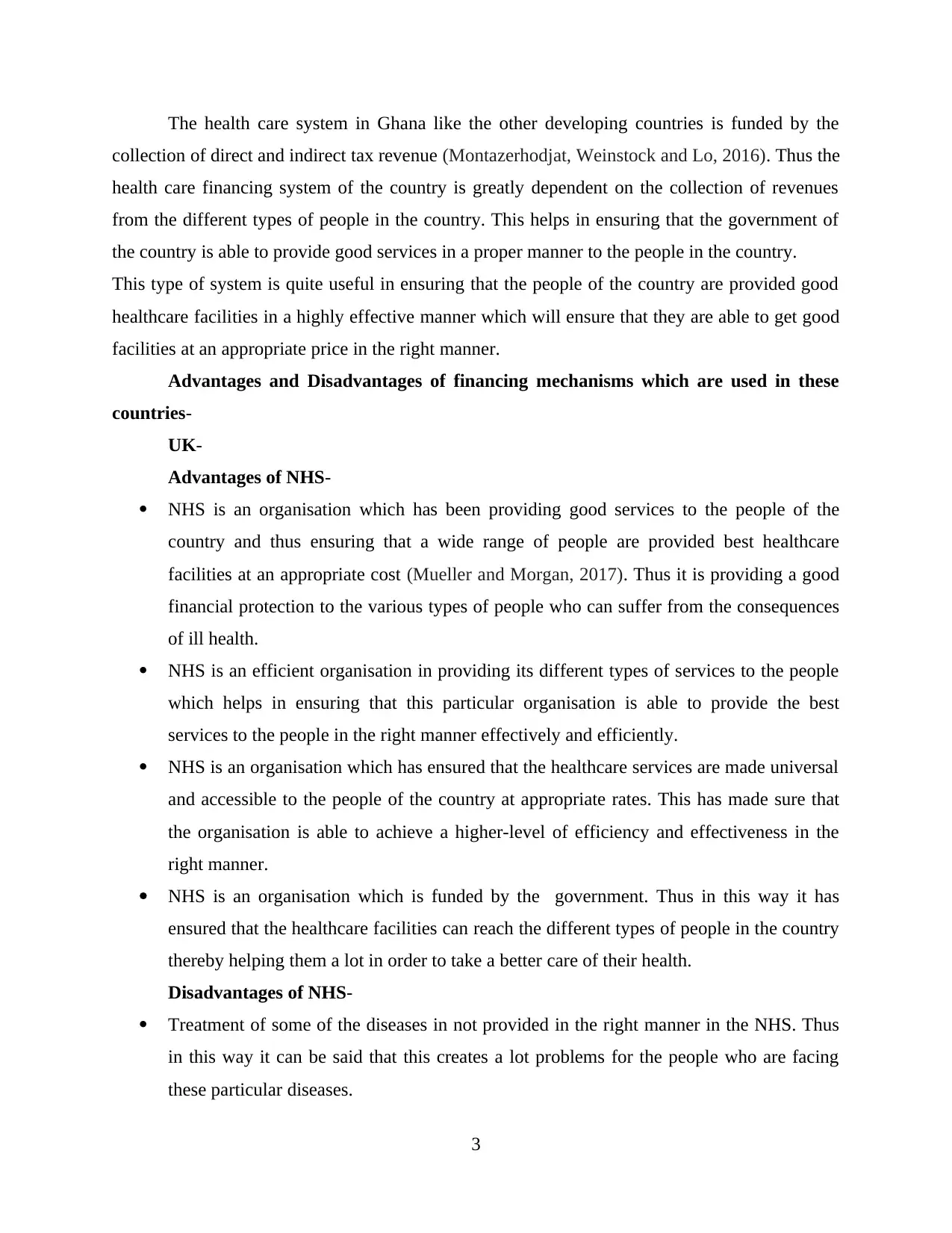
The health care system in Ghana like the other developing countries is funded by the
collection of direct and indirect tax revenue (Montazerhodjat, Weinstock and Lo, 2016). Thus the
health care financing system of the country is greatly dependent on the collection of revenues
from the different types of people in the country. This helps in ensuring that the government of
the country is able to provide good services in a proper manner to the people in the country.
This type of system is quite useful in ensuring that the people of the country are provided good
healthcare facilities in a highly effective manner which will ensure that they are able to get good
facilities at an appropriate price in the right manner.
Advantages and Disadvantages of financing mechanisms which are used in these
countries-
UK-
Advantages of NHS-
NHS is an organisation which has been providing good services to the people of the
country and thus ensuring that a wide range of people are provided best healthcare
facilities at an appropriate cost (Mueller and Morgan, 2017). Thus it is providing a good
financial protection to the various types of people who can suffer from the consequences
of ill health.
NHS is an efficient organisation in providing its different types of services to the people
which helps in ensuring that this particular organisation is able to provide the best
services to the people in the right manner effectively and efficiently.
NHS is an organisation which has ensured that the healthcare services are made universal
and accessible to the people of the country at appropriate rates. This has made sure that
the organisation is able to achieve a higher-level of efficiency and effectiveness in the
right manner.
NHS is an organisation which is funded by the government. Thus in this way it has
ensured that the healthcare facilities can reach the different types of people in the country
thereby helping them a lot in order to take a better care of their health.
Disadvantages of NHS-
Treatment of some of the diseases in not provided in the right manner in the NHS. Thus
in this way it can be said that this creates a lot problems for the people who are facing
these particular diseases.
3
collection of direct and indirect tax revenue (Montazerhodjat, Weinstock and Lo, 2016). Thus the
health care financing system of the country is greatly dependent on the collection of revenues
from the different types of people in the country. This helps in ensuring that the government of
the country is able to provide good services in a proper manner to the people in the country.
This type of system is quite useful in ensuring that the people of the country are provided good
healthcare facilities in a highly effective manner which will ensure that they are able to get good
facilities at an appropriate price in the right manner.
Advantages and Disadvantages of financing mechanisms which are used in these
countries-
UK-
Advantages of NHS-
NHS is an organisation which has been providing good services to the people of the
country and thus ensuring that a wide range of people are provided best healthcare
facilities at an appropriate cost (Mueller and Morgan, 2017). Thus it is providing a good
financial protection to the various types of people who can suffer from the consequences
of ill health.
NHS is an efficient organisation in providing its different types of services to the people
which helps in ensuring that this particular organisation is able to provide the best
services to the people in the right manner effectively and efficiently.
NHS is an organisation which has ensured that the healthcare services are made universal
and accessible to the people of the country at appropriate rates. This has made sure that
the organisation is able to achieve a higher-level of efficiency and effectiveness in the
right manner.
NHS is an organisation which is funded by the government. Thus in this way it has
ensured that the healthcare facilities can reach the different types of people in the country
thereby helping them a lot in order to take a better care of their health.
Disadvantages of NHS-
Treatment of some of the diseases in not provided in the right manner in the NHS. Thus
in this way it can be said that this creates a lot problems for the people who are facing
these particular diseases.
3
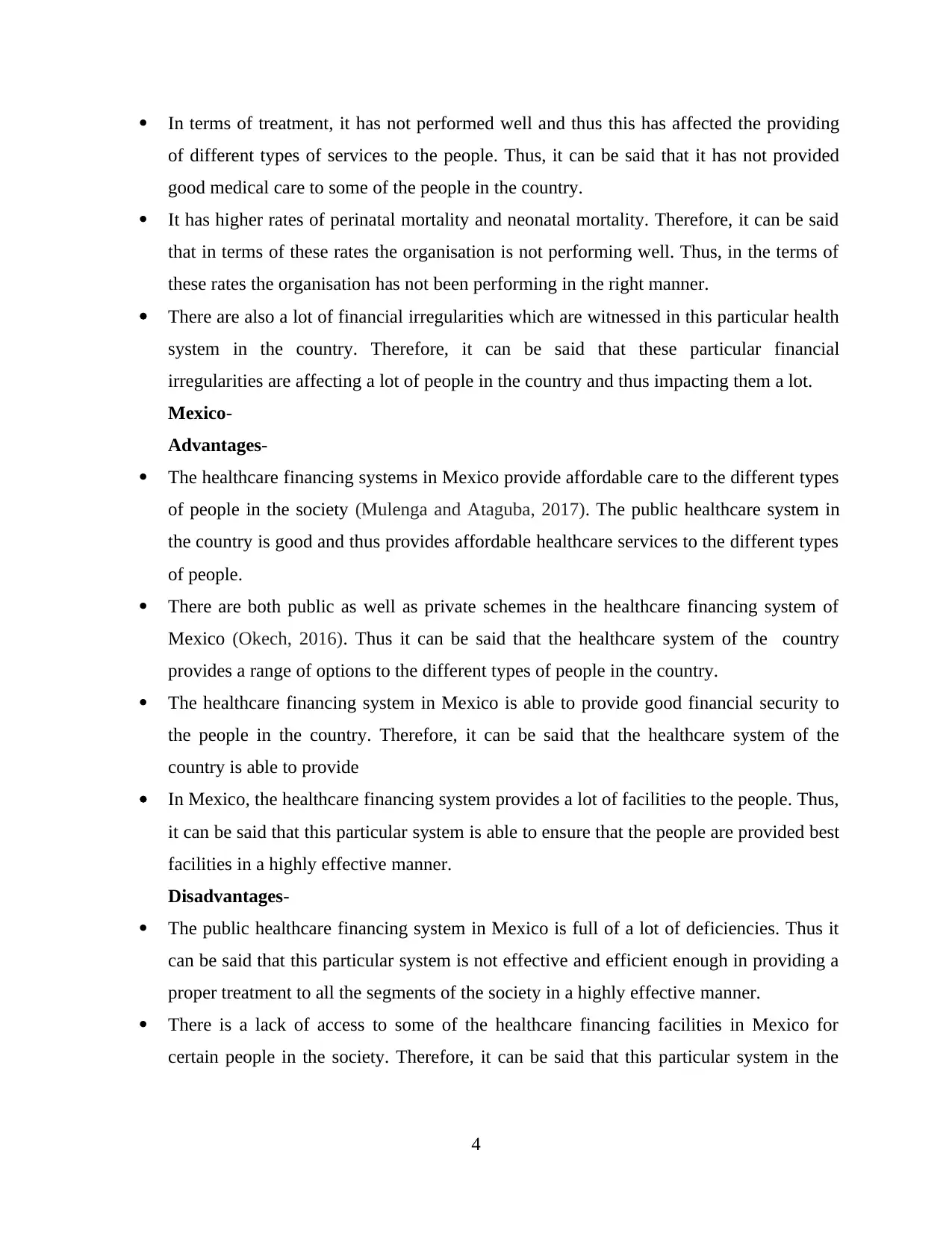
In terms of treatment, it has not performed well and thus this has affected the providing
of different types of services to the people. Thus, it can be said that it has not provided
good medical care to some of the people in the country.
It has higher rates of perinatal mortality and neonatal mortality. Therefore, it can be said
that in terms of these rates the organisation is not performing well. Thus, in the terms of
these rates the organisation has not been performing in the right manner.
There are also a lot of financial irregularities which are witnessed in this particular health
system in the country. Therefore, it can be said that these particular financial
irregularities are affecting a lot of people in the country and thus impacting them a lot.
Mexico-
Advantages-
The healthcare financing systems in Mexico provide affordable care to the different types
of people in the society (Mulenga and Ataguba, 2017). The public healthcare system in
the country is good and thus provides affordable healthcare services to the different types
of people.
There are both public as well as private schemes in the healthcare financing system of
Mexico (Okech, 2016). Thus it can be said that the healthcare system of the country
provides a range of options to the different types of people in the country.
The healthcare financing system in Mexico is able to provide good financial security to
the people in the country. Therefore, it can be said that the healthcare system of the
country is able to provide
In Mexico, the healthcare financing system provides a lot of facilities to the people. Thus,
it can be said that this particular system is able to ensure that the people are provided best
facilities in a highly effective manner.
Disadvantages-
The public healthcare financing system in Mexico is full of a lot of deficiencies. Thus it
can be said that this particular system is not effective and efficient enough in providing a
proper treatment to all the segments of the society in a highly effective manner.
There is a lack of access to some of the healthcare financing facilities in Mexico for
certain people in the society. Therefore, it can be said that this particular system in the
4
of different types of services to the people. Thus, it can be said that it has not provided
good medical care to some of the people in the country.
It has higher rates of perinatal mortality and neonatal mortality. Therefore, it can be said
that in terms of these rates the organisation is not performing well. Thus, in the terms of
these rates the organisation has not been performing in the right manner.
There are also a lot of financial irregularities which are witnessed in this particular health
system in the country. Therefore, it can be said that these particular financial
irregularities are affecting a lot of people in the country and thus impacting them a lot.
Mexico-
Advantages-
The healthcare financing systems in Mexico provide affordable care to the different types
of people in the society (Mulenga and Ataguba, 2017). The public healthcare system in
the country is good and thus provides affordable healthcare services to the different types
of people.
There are both public as well as private schemes in the healthcare financing system of
Mexico (Okech, 2016). Thus it can be said that the healthcare system of the country
provides a range of options to the different types of people in the country.
The healthcare financing system in Mexico is able to provide good financial security to
the people in the country. Therefore, it can be said that the healthcare system of the
country is able to provide
In Mexico, the healthcare financing system provides a lot of facilities to the people. Thus,
it can be said that this particular system is able to ensure that the people are provided best
facilities in a highly effective manner.
Disadvantages-
The public healthcare financing system in Mexico is full of a lot of deficiencies. Thus it
can be said that this particular system is not effective and efficient enough in providing a
proper treatment to all the segments of the society in a highly effective manner.
There is a lack of access to some of the healthcare financing facilities in Mexico for
certain people in the society. Therefore, it can be said that this particular system in the
4
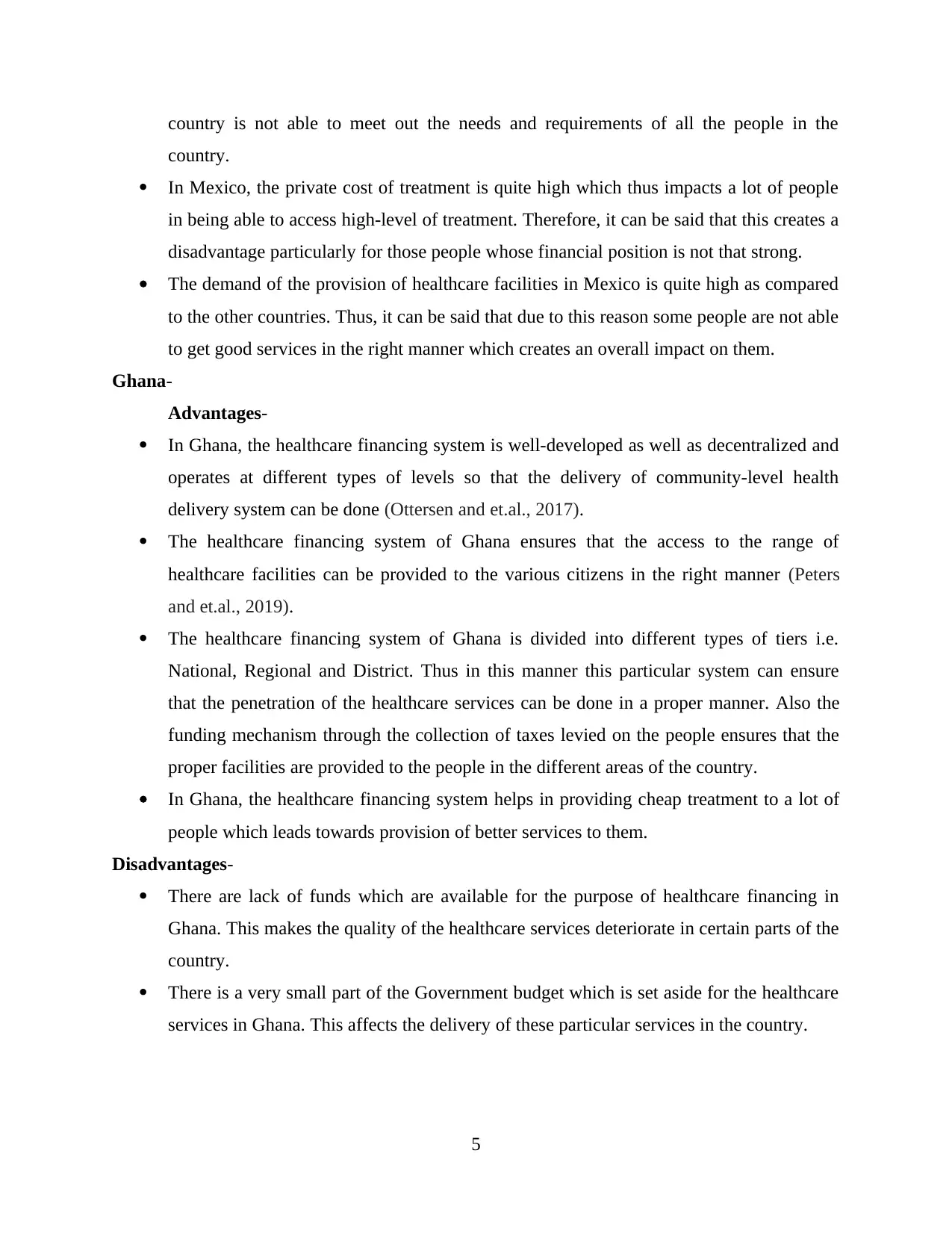
country is not able to meet out the needs and requirements of all the people in the
country.
In Mexico, the private cost of treatment is quite high which thus impacts a lot of people
in being able to access high-level of treatment. Therefore, it can be said that this creates a
disadvantage particularly for those people whose financial position is not that strong.
The demand of the provision of healthcare facilities in Mexico is quite high as compared
to the other countries. Thus, it can be said that due to this reason some people are not able
to get good services in the right manner which creates an overall impact on them.
Ghana-
Advantages-
In Ghana, the healthcare financing system is well-developed as well as decentralized and
operates at different types of levels so that the delivery of community-level health
delivery system can be done (Ottersen and et.al., 2017).
The healthcare financing system of Ghana ensures that the access to the range of
healthcare facilities can be provided to the various citizens in the right manner (Peters
and et.al., 2019).
The healthcare financing system of Ghana is divided into different types of tiers i.e.
National, Regional and District. Thus in this manner this particular system can ensure
that the penetration of the healthcare services can be done in a proper manner. Also the
funding mechanism through the collection of taxes levied on the people ensures that the
proper facilities are provided to the people in the different areas of the country.
In Ghana, the healthcare financing system helps in providing cheap treatment to a lot of
people which leads towards provision of better services to them.
Disadvantages-
There are lack of funds which are available for the purpose of healthcare financing in
Ghana. This makes the quality of the healthcare services deteriorate in certain parts of the
country.
There is a very small part of the Government budget which is set aside for the healthcare
services in Ghana. This affects the delivery of these particular services in the country.
5
country.
In Mexico, the private cost of treatment is quite high which thus impacts a lot of people
in being able to access high-level of treatment. Therefore, it can be said that this creates a
disadvantage particularly for those people whose financial position is not that strong.
The demand of the provision of healthcare facilities in Mexico is quite high as compared
to the other countries. Thus, it can be said that due to this reason some people are not able
to get good services in the right manner which creates an overall impact on them.
Ghana-
Advantages-
In Ghana, the healthcare financing system is well-developed as well as decentralized and
operates at different types of levels so that the delivery of community-level health
delivery system can be done (Ottersen and et.al., 2017).
The healthcare financing system of Ghana ensures that the access to the range of
healthcare facilities can be provided to the various citizens in the right manner (Peters
and et.al., 2019).
The healthcare financing system of Ghana is divided into different types of tiers i.e.
National, Regional and District. Thus in this manner this particular system can ensure
that the penetration of the healthcare services can be done in a proper manner. Also the
funding mechanism through the collection of taxes levied on the people ensures that the
proper facilities are provided to the people in the different areas of the country.
In Ghana, the healthcare financing system helps in providing cheap treatment to a lot of
people which leads towards provision of better services to them.
Disadvantages-
There are lack of funds which are available for the purpose of healthcare financing in
Ghana. This makes the quality of the healthcare services deteriorate in certain parts of the
country.
There is a very small part of the Government budget which is set aside for the healthcare
services in Ghana. This affects the delivery of these particular services in the country.
5
Paraphrase This Document
Need a fresh take? Get an instant paraphrase of this document with our AI Paraphraser
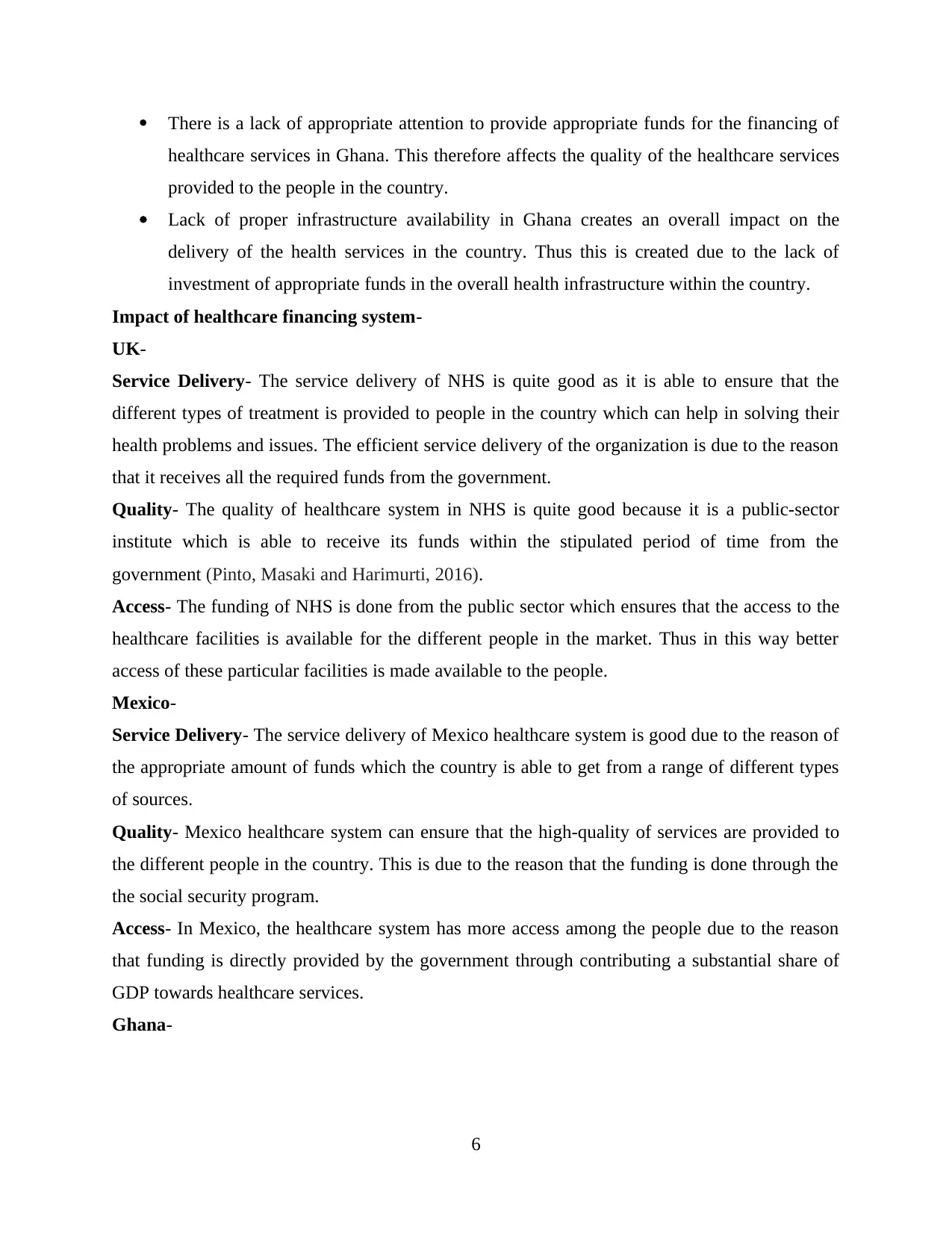
There is a lack of appropriate attention to provide appropriate funds for the financing of
healthcare services in Ghana. This therefore affects the quality of the healthcare services
provided to the people in the country.
Lack of proper infrastructure availability in Ghana creates an overall impact on the
delivery of the health services in the country. Thus this is created due to the lack of
investment of appropriate funds in the overall health infrastructure within the country.
Impact of healthcare financing system-
UK-
Service Delivery- The service delivery of NHS is quite good as it is able to ensure that the
different types of treatment is provided to people in the country which can help in solving their
health problems and issues. The efficient service delivery of the organization is due to the reason
that it receives all the required funds from the government.
Quality- The quality of healthcare system in NHS is quite good because it is a public-sector
institute which is able to receive its funds within the stipulated period of time from the
government (Pinto, Masaki and Harimurti, 2016).
Access- The funding of NHS is done from the public sector which ensures that the access to the
healthcare facilities is available for the different people in the market. Thus in this way better
access of these particular facilities is made available to the people.
Mexico-
Service Delivery- The service delivery of Mexico healthcare system is good due to the reason of
the appropriate amount of funds which the country is able to get from a range of different types
of sources.
Quality- Mexico healthcare system can ensure that the high-quality of services are provided to
the different people in the country. This is due to the reason that the funding is done through the
the social security program.
Access- In Mexico, the healthcare system has more access among the people due to the reason
that funding is directly provided by the government through contributing a substantial share of
GDP towards healthcare services.
Ghana-
6
healthcare services in Ghana. This therefore affects the quality of the healthcare services
provided to the people in the country.
Lack of proper infrastructure availability in Ghana creates an overall impact on the
delivery of the health services in the country. Thus this is created due to the lack of
investment of appropriate funds in the overall health infrastructure within the country.
Impact of healthcare financing system-
UK-
Service Delivery- The service delivery of NHS is quite good as it is able to ensure that the
different types of treatment is provided to people in the country which can help in solving their
health problems and issues. The efficient service delivery of the organization is due to the reason
that it receives all the required funds from the government.
Quality- The quality of healthcare system in NHS is quite good because it is a public-sector
institute which is able to receive its funds within the stipulated period of time from the
government (Pinto, Masaki and Harimurti, 2016).
Access- The funding of NHS is done from the public sector which ensures that the access to the
healthcare facilities is available for the different people in the market. Thus in this way better
access of these particular facilities is made available to the people.
Mexico-
Service Delivery- The service delivery of Mexico healthcare system is good due to the reason of
the appropriate amount of funds which the country is able to get from a range of different types
of sources.
Quality- Mexico healthcare system can ensure that the high-quality of services are provided to
the different people in the country. This is due to the reason that the funding is done through the
the social security program.
Access- In Mexico, the healthcare system has more access among the people due to the reason
that funding is directly provided by the government through contributing a substantial share of
GDP towards healthcare services.
Ghana-
6
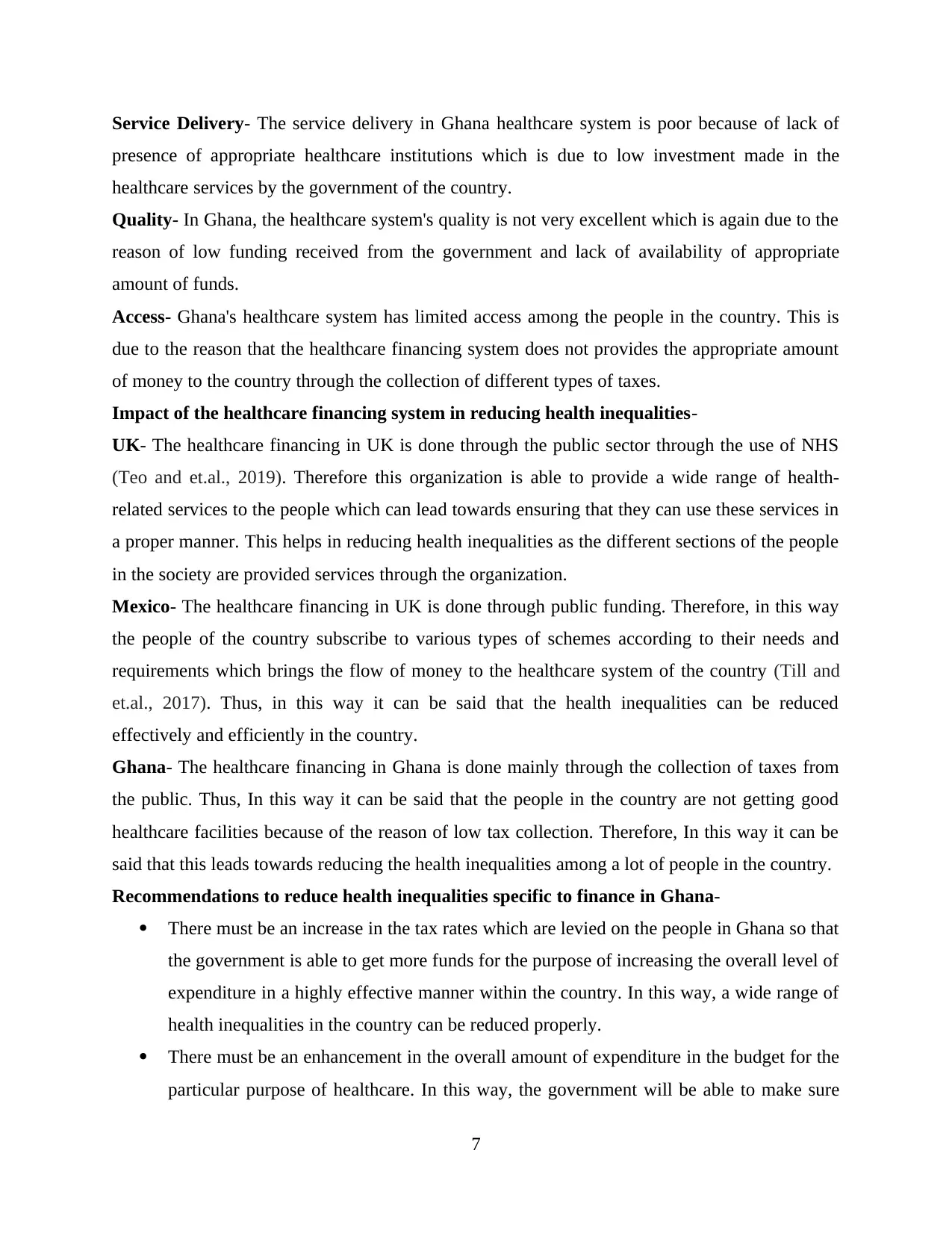
Service Delivery- The service delivery in Ghana healthcare system is poor because of lack of
presence of appropriate healthcare institutions which is due to low investment made in the
healthcare services by the government of the country.
Quality- In Ghana, the healthcare system's quality is not very excellent which is again due to the
reason of low funding received from the government and lack of availability of appropriate
amount of funds.
Access- Ghana's healthcare system has limited access among the people in the country. This is
due to the reason that the healthcare financing system does not provides the appropriate amount
of money to the country through the collection of different types of taxes.
Impact of the healthcare financing system in reducing health inequalities-
UK- The healthcare financing in UK is done through the public sector through the use of NHS
(Teo and et.al., 2019). Therefore this organization is able to provide a wide range of health-
related services to the people which can lead towards ensuring that they can use these services in
a proper manner. This helps in reducing health inequalities as the different sections of the people
in the society are provided services through the organization.
Mexico- The healthcare financing in UK is done through public funding. Therefore, in this way
the people of the country subscribe to various types of schemes according to their needs and
requirements which brings the flow of money to the healthcare system of the country (Till and
et.al., 2017). Thus, in this way it can be said that the health inequalities can be reduced
effectively and efficiently in the country.
Ghana- The healthcare financing in Ghana is done mainly through the collection of taxes from
the public. Thus, In this way it can be said that the people in the country are not getting good
healthcare facilities because of the reason of low tax collection. Therefore, In this way it can be
said that this leads towards reducing the health inequalities among a lot of people in the country.
Recommendations to reduce health inequalities specific to finance in Ghana-
There must be an increase in the tax rates which are levied on the people in Ghana so that
the government is able to get more funds for the purpose of increasing the overall level of
expenditure in a highly effective manner within the country. In this way, a wide range of
health inequalities in the country can be reduced properly.
There must be an enhancement in the overall amount of expenditure in the budget for the
particular purpose of healthcare. In this way, the government will be able to make sure
7
presence of appropriate healthcare institutions which is due to low investment made in the
healthcare services by the government of the country.
Quality- In Ghana, the healthcare system's quality is not very excellent which is again due to the
reason of low funding received from the government and lack of availability of appropriate
amount of funds.
Access- Ghana's healthcare system has limited access among the people in the country. This is
due to the reason that the healthcare financing system does not provides the appropriate amount
of money to the country through the collection of different types of taxes.
Impact of the healthcare financing system in reducing health inequalities-
UK- The healthcare financing in UK is done through the public sector through the use of NHS
(Teo and et.al., 2019). Therefore this organization is able to provide a wide range of health-
related services to the people which can lead towards ensuring that they can use these services in
a proper manner. This helps in reducing health inequalities as the different sections of the people
in the society are provided services through the organization.
Mexico- The healthcare financing in UK is done through public funding. Therefore, in this way
the people of the country subscribe to various types of schemes according to their needs and
requirements which brings the flow of money to the healthcare system of the country (Till and
et.al., 2017). Thus, in this way it can be said that the health inequalities can be reduced
effectively and efficiently in the country.
Ghana- The healthcare financing in Ghana is done mainly through the collection of taxes from
the public. Thus, In this way it can be said that the people in the country are not getting good
healthcare facilities because of the reason of low tax collection. Therefore, In this way it can be
said that this leads towards reducing the health inequalities among a lot of people in the country.
Recommendations to reduce health inequalities specific to finance in Ghana-
There must be an increase in the tax rates which are levied on the people in Ghana so that
the government is able to get more funds for the purpose of increasing the overall level of
expenditure in a highly effective manner within the country. In this way, a wide range of
health inequalities in the country can be reduced properly.
There must be an enhancement in the overall amount of expenditure in the budget for the
particular purpose of healthcare. In this way, the government will be able to make sure
7
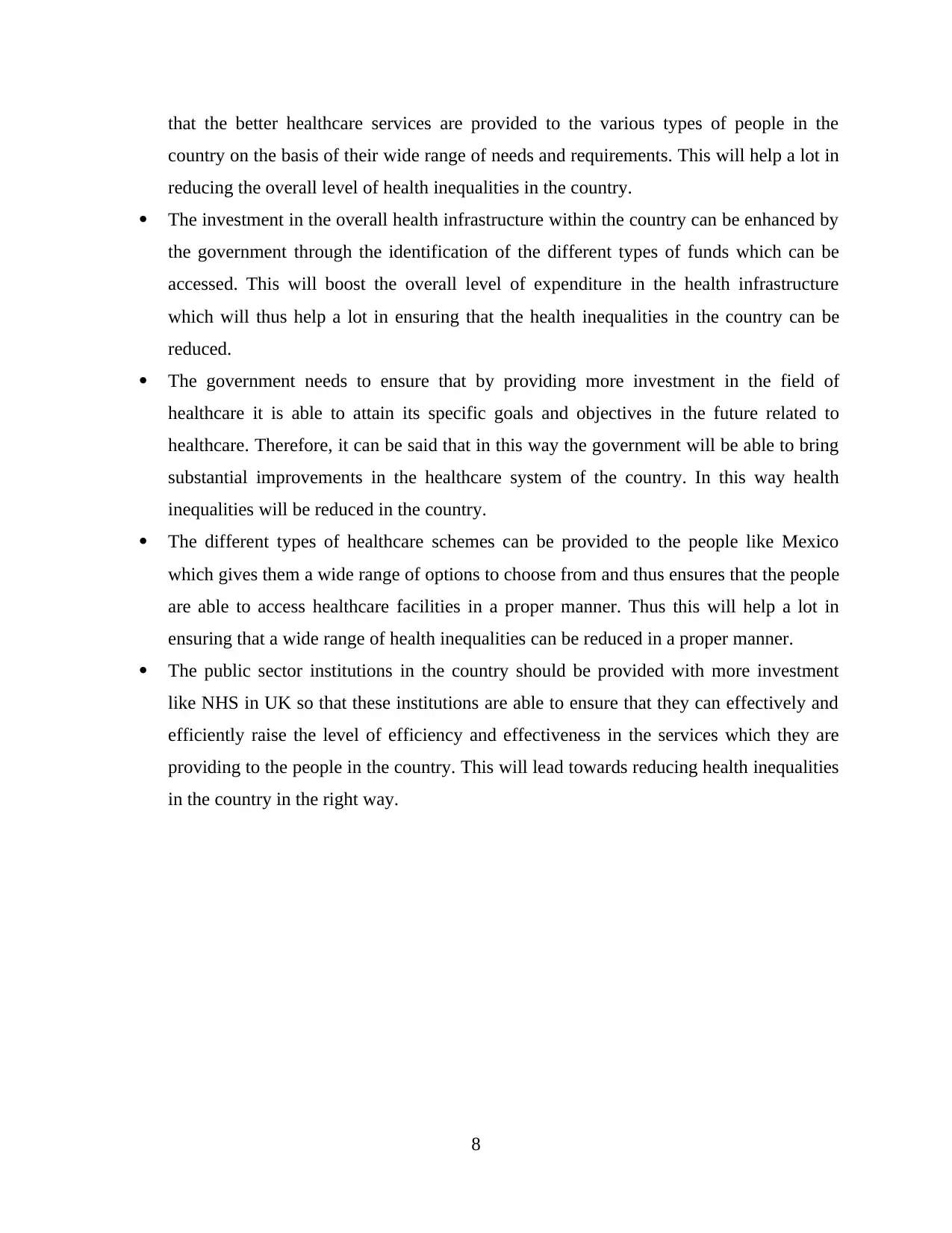
that the better healthcare services are provided to the various types of people in the
country on the basis of their wide range of needs and requirements. This will help a lot in
reducing the overall level of health inequalities in the country.
The investment in the overall health infrastructure within the country can be enhanced by
the government through the identification of the different types of funds which can be
accessed. This will boost the overall level of expenditure in the health infrastructure
which will thus help a lot in ensuring that the health inequalities in the country can be
reduced.
The government needs to ensure that by providing more investment in the field of
healthcare it is able to attain its specific goals and objectives in the future related to
healthcare. Therefore, it can be said that in this way the government will be able to bring
substantial improvements in the healthcare system of the country. In this way health
inequalities will be reduced in the country.
The different types of healthcare schemes can be provided to the people like Mexico
which gives them a wide range of options to choose from and thus ensures that the people
are able to access healthcare facilities in a proper manner. Thus this will help a lot in
ensuring that a wide range of health inequalities can be reduced in a proper manner.
The public sector institutions in the country should be provided with more investment
like NHS in UK so that these institutions are able to ensure that they can effectively and
efficiently raise the level of efficiency and effectiveness in the services which they are
providing to the people in the country. This will lead towards reducing health inequalities
in the country in the right way.
8
country on the basis of their wide range of needs and requirements. This will help a lot in
reducing the overall level of health inequalities in the country.
The investment in the overall health infrastructure within the country can be enhanced by
the government through the identification of the different types of funds which can be
accessed. This will boost the overall level of expenditure in the health infrastructure
which will thus help a lot in ensuring that the health inequalities in the country can be
reduced.
The government needs to ensure that by providing more investment in the field of
healthcare it is able to attain its specific goals and objectives in the future related to
healthcare. Therefore, it can be said that in this way the government will be able to bring
substantial improvements in the healthcare system of the country. In this way health
inequalities will be reduced in the country.
The different types of healthcare schemes can be provided to the people like Mexico
which gives them a wide range of options to choose from and thus ensures that the people
are able to access healthcare facilities in a proper manner. Thus this will help a lot in
ensuring that a wide range of health inequalities can be reduced in a proper manner.
The public sector institutions in the country should be provided with more investment
like NHS in UK so that these institutions are able to ensure that they can effectively and
efficiently raise the level of efficiency and effectiveness in the services which they are
providing to the people in the country. This will lead towards reducing health inequalities
in the country in the right way.
8
Secure Best Marks with AI Grader
Need help grading? Try our AI Grader for instant feedback on your assignments.
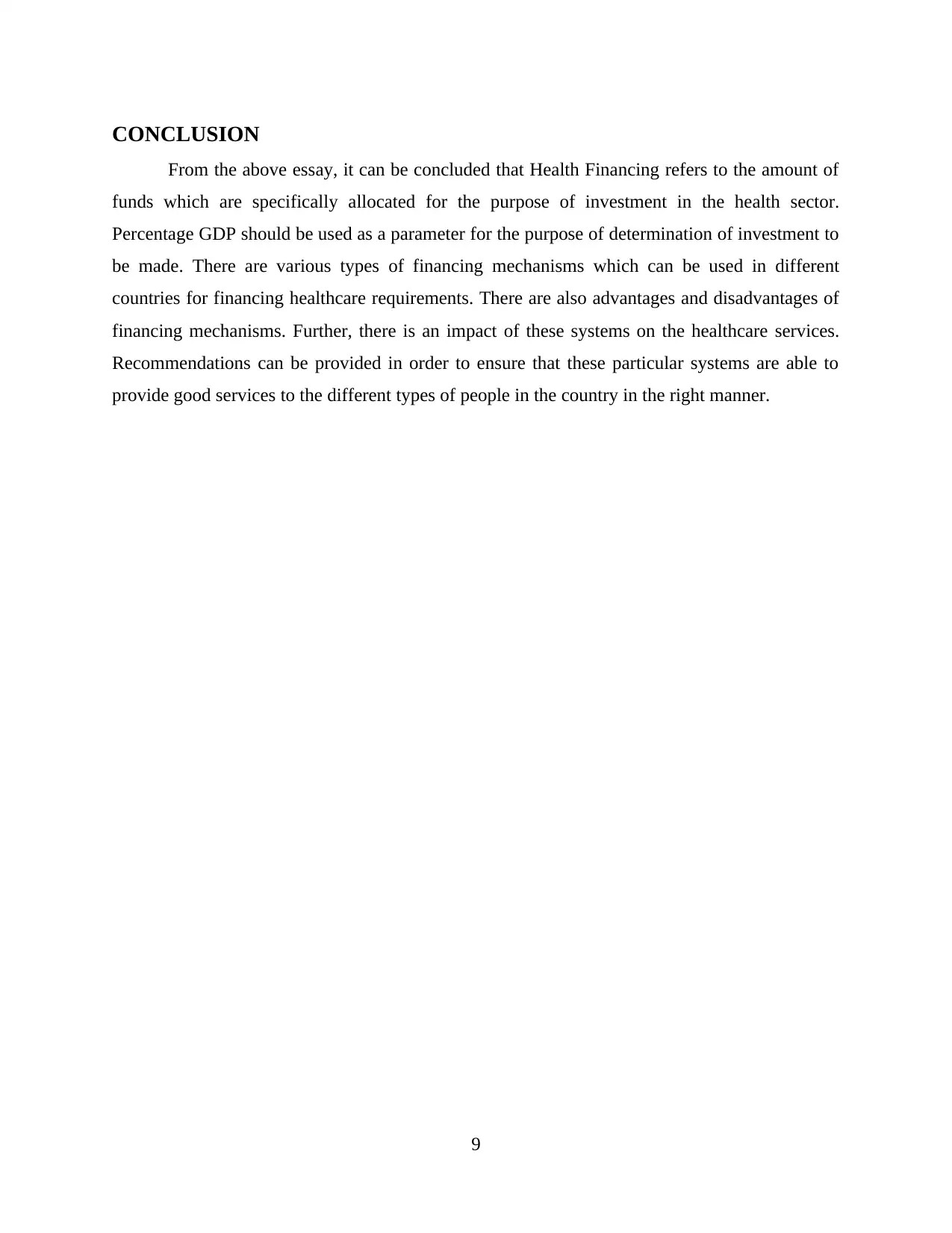
CONCLUSION
From the above essay, it can be concluded that Health Financing refers to the amount of
funds which are specifically allocated for the purpose of investment in the health sector.
Percentage GDP should be used as a parameter for the purpose of determination of investment to
be made. There are various types of financing mechanisms which can be used in different
countries for financing healthcare requirements. There are also advantages and disadvantages of
financing mechanisms. Further, there is an impact of these systems on the healthcare services.
Recommendations can be provided in order to ensure that these particular systems are able to
provide good services to the different types of people in the country in the right manner.
9
From the above essay, it can be concluded that Health Financing refers to the amount of
funds which are specifically allocated for the purpose of investment in the health sector.
Percentage GDP should be used as a parameter for the purpose of determination of investment to
be made. There are various types of financing mechanisms which can be used in different
countries for financing healthcare requirements. There are also advantages and disadvantages of
financing mechanisms. Further, there is an impact of these systems on the healthcare services.
Recommendations can be provided in order to ensure that these particular systems are able to
provide good services to the different types of people in the country in the right manner.
9
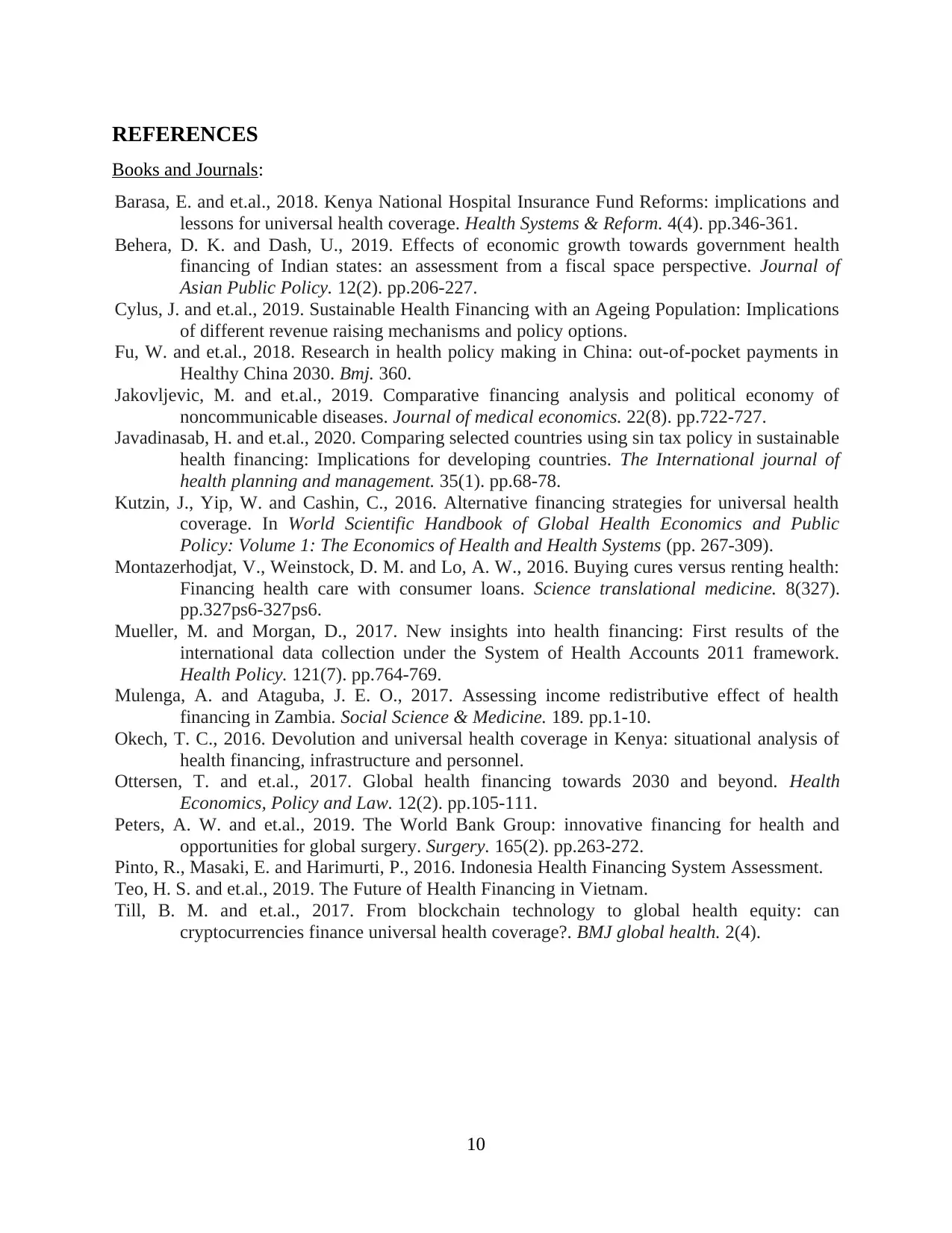
REFERENCES
Books and Journals:
Barasa, E. and et.al., 2018. Kenya National Hospital Insurance Fund Reforms: implications and
lessons for universal health coverage. Health Systems & Reform. 4(4). pp.346-361.
Behera, D. K. and Dash, U., 2019. Effects of economic growth towards government health
financing of Indian states: an assessment from a fiscal space perspective. Journal of
Asian Public Policy. 12(2). pp.206-227.
Cylus, J. and et.al., 2019. Sustainable Health Financing with an Ageing Population: Implications
of different revenue raising mechanisms and policy options.
Fu, W. and et.al., 2018. Research in health policy making in China: out-of-pocket payments in
Healthy China 2030. Bmj. 360.
Jakovljevic, M. and et.al., 2019. Comparative financing analysis and political economy of
noncommunicable diseases. Journal of medical economics. 22(8). pp.722-727.
Javadinasab, H. and et.al., 2020. Comparing selected countries using sin tax policy in sustainable
health financing: Implications for developing countries. The International journal of
health planning and management. 35(1). pp.68-78.
Kutzin, J., Yip, W. and Cashin, C., 2016. Alternative financing strategies for universal health
coverage. In World Scientific Handbook of Global Health Economics and Public
Policy: Volume 1: The Economics of Health and Health Systems (pp. 267-309).
Montazerhodjat, V., Weinstock, D. M. and Lo, A. W., 2016. Buying cures versus renting health:
Financing health care with consumer loans. Science translational medicine. 8(327).
pp.327ps6-327ps6.
Mueller, M. and Morgan, D., 2017. New insights into health financing: First results of the
international data collection under the System of Health Accounts 2011 framework.
Health Policy. 121(7). pp.764-769.
Mulenga, A. and Ataguba, J. E. O., 2017. Assessing income redistributive effect of health
financing in Zambia. Social Science & Medicine. 189. pp.1-10.
Okech, T. C., 2016. Devolution and universal health coverage in Kenya: situational analysis of
health financing, infrastructure and personnel.
Ottersen, T. and et.al., 2017. Global health financing towards 2030 and beyond. Health
Economics, Policy and Law. 12(2). pp.105-111.
Peters, A. W. and et.al., 2019. The World Bank Group: innovative financing for health and
opportunities for global surgery. Surgery. 165(2). pp.263-272.
Pinto, R., Masaki, E. and Harimurti, P., 2016. Indonesia Health Financing System Assessment.
Teo, H. S. and et.al., 2019. The Future of Health Financing in Vietnam.
Till, B. M. and et.al., 2017. From blockchain technology to global health equity: can
cryptocurrencies finance universal health coverage?. BMJ global health. 2(4).
10
Books and Journals:
Barasa, E. and et.al., 2018. Kenya National Hospital Insurance Fund Reforms: implications and
lessons for universal health coverage. Health Systems & Reform. 4(4). pp.346-361.
Behera, D. K. and Dash, U., 2019. Effects of economic growth towards government health
financing of Indian states: an assessment from a fiscal space perspective. Journal of
Asian Public Policy. 12(2). pp.206-227.
Cylus, J. and et.al., 2019. Sustainable Health Financing with an Ageing Population: Implications
of different revenue raising mechanisms and policy options.
Fu, W. and et.al., 2018. Research in health policy making in China: out-of-pocket payments in
Healthy China 2030. Bmj. 360.
Jakovljevic, M. and et.al., 2019. Comparative financing analysis and political economy of
noncommunicable diseases. Journal of medical economics. 22(8). pp.722-727.
Javadinasab, H. and et.al., 2020. Comparing selected countries using sin tax policy in sustainable
health financing: Implications for developing countries. The International journal of
health planning and management. 35(1). pp.68-78.
Kutzin, J., Yip, W. and Cashin, C., 2016. Alternative financing strategies for universal health
coverage. In World Scientific Handbook of Global Health Economics and Public
Policy: Volume 1: The Economics of Health and Health Systems (pp. 267-309).
Montazerhodjat, V., Weinstock, D. M. and Lo, A. W., 2016. Buying cures versus renting health:
Financing health care with consumer loans. Science translational medicine. 8(327).
pp.327ps6-327ps6.
Mueller, M. and Morgan, D., 2017. New insights into health financing: First results of the
international data collection under the System of Health Accounts 2011 framework.
Health Policy. 121(7). pp.764-769.
Mulenga, A. and Ataguba, J. E. O., 2017. Assessing income redistributive effect of health
financing in Zambia. Social Science & Medicine. 189. pp.1-10.
Okech, T. C., 2016. Devolution and universal health coverage in Kenya: situational analysis of
health financing, infrastructure and personnel.
Ottersen, T. and et.al., 2017. Global health financing towards 2030 and beyond. Health
Economics, Policy and Law. 12(2). pp.105-111.
Peters, A. W. and et.al., 2019. The World Bank Group: innovative financing for health and
opportunities for global surgery. Surgery. 165(2). pp.263-272.
Pinto, R., Masaki, E. and Harimurti, P., 2016. Indonesia Health Financing System Assessment.
Teo, H. S. and et.al., 2019. The Future of Health Financing in Vietnam.
Till, B. M. and et.al., 2017. From blockchain technology to global health equity: can
cryptocurrencies finance universal health coverage?. BMJ global health. 2(4).
10
1 out of 12
Related Documents
Your All-in-One AI-Powered Toolkit for Academic Success.
+13062052269
info@desklib.com
Available 24*7 on WhatsApp / Email
![[object Object]](/_next/static/media/star-bottom.7253800d.svg)
Unlock your academic potential
© 2024 | Zucol Services PVT LTD | All rights reserved.





